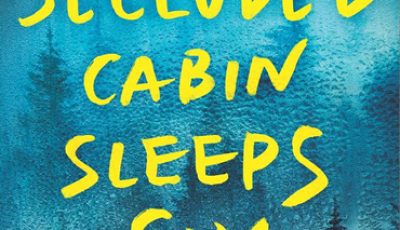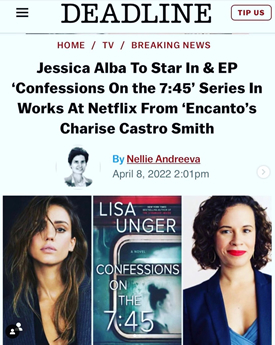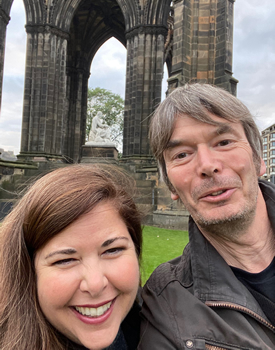

Features On the Cover: Lisa Unger
Who’s Your Daddy?
 By K.L. Romo
By K.L. Romo
How well do you think you know those closest to you? Have you uncovered all their secrets? Are you sure?
In her 20th novel, SECLUDED CABIN SLEEPS SIX, those are the questions bestselling author Lisa Unger poses to us. Combining our fascination with DNA testing and genetic analysis and the ultimate question of nature-versus-nurture, she compels us to question whether our lives are fated before birth.
Everyone in siblings Hannah and Mako’s family is shocked when they open gifts to find Origins DNA testing kits for each of them. But how did they get there? No one confesses to bringing them.
Six months later, Mako rents a luxury cabin in the remote Georgia woods for the family: Hannah and her husband, Bruce; Mako and his wife, Liza; and Hannah’s best friend, Cricket, and her boyfriend. Mako loves to impress his family with “epic” vacations that he pays for.
At first, everyone seems to be having a good time. But they soon discover the DNA kits have linked them to a sociopath—a broken branch on their family tree. A violent storm eliminates the calming effects of nature, stranding the group at their cabin. Then an outsider who manipulates the group causes long-held family secrets to surface, detonating their “perfect family” lives. Who will live and who will die?
Unger compels readers to consider if our DNA curses us, or if we can control our lives by the choices we make. How well do we know our family, friends, and even ourselves? How far would we go to protect those we love?
Here, Unger talks with The Big Thrill about her inspiration, her “dark and twisted imagination,” the age-old question of nature-versus-nurture, and society’s fascination with DNA testing.
What inspired the story in the book?
This novel was partially inspired by my family’s visits to secluded cabins deep in the woods—some of them in the Blue Ridge area of Georgia, some in the Asheville area of North Carolina—during the pandemic. My writer’s mind found these remote and beautifully appointed getaways the perfect setting for imagining frightening scenarios.
For example, I just couldn’t stop wondering about the door locks. The code—did everyone who rented the cabin get the same entry code? Or was it changed every time? When I was sitting alone on the porch in front of the outdoor fireplace, a bearded older man, with a head of long gray hair and a baseball cap, rode up the drive in a Gator and informed me that sometimes he “looked in” on the property for the owners. He drove off without another word. I thought about that old guy—a lot—and wondered what he’d meant by “looking in.” And it was quiet. And it was really, really dark—no other houses around for miles. You see where I’m going with this, right?
There were other things, too. One of these trips involved my extended family. If you’ve ever vacationed with your relatives, maybe you found it “inspirational” as well. Add in my ongoing obsession with DNA testing and the secrets it often reveals about our family of origin, and, well, that’s kind of how it works for me. Some alchemy of experiences, ideas, research, a dark and twisted imagination, and I’m writing a novel.
So what do our lives result from most, nature or nurture?
I don’t think there’s an easy answer here. Most likely, it’s an impossibly complicated helix of both. Genetics only tell part of the story. And the same traumatic event can affect different people in completely opposite ways. For some, adversity strengthens us. For others, it can lead to dark roads, like addiction. And addiction has a way of messing with our lives in ways that confound nature and nurture.
It’s tempting to imagine a one-size-fits-all answer to this question. But our uniqueness is determined by factors of experience, ancestry, biology, psychology, and more. It’s possible that there are as many answers to this question as there are people.
Have you taken a DNA test and if so, did you learn anything surprising? Can commercial DNA testing be dangerous?
I have not, though I was tempted to do so just to research this book. I admit to having a deep curiosity about the entire process. There’s so much information available to us about our ancestors and biology, so it’s tempting to dive into the past and into our genetics. After all, we love to know about ourselves.
But it was that research that led to the conclusion that it’s not something I want to do. For me, it’s a question of trusting that information to a corporation motivated only by profit. It’s a dangerous thing to give away your genetic data to companies or organizations that may run agendas of which you’re not even aware. What they might use that data for now, or in the future as laws, mores, and regimes change? To whom might they sell it?
For example, say your test indicated some genetic predisposition to a disease. How could that information be used against you in the future—when you’re trying to get insurance or even a job? In terms of privacy protection, I’m not sure corporations have earned our trust, no matter what they may claim.
There’s a very interesting book I read for research entitled The Lost Family: How DNA Testing Is Upending Who We Are by Libby Copeland. This is a stunning, layered investigation into the field of consumer testing. I would suggest reading it before you take any kind of DNA test.
Tell us more about how your writing could be classified as “experimental.”
Is it classified as experimental? Isn’t all writing experimental in some way?
I suppose if you’ve been reading my work since my first book, Angel Fire, published in 2002, you might say that all my novels differ from each other in some ways. Or not—as they’re all character-driven thrillers that dive deep into psychology, the question of identity, and what makes us who we are. I suppose I don’t follow a formula, and I allow the narrative and characters to flow organically. Sometimes the books go places that maybe other thrillers don’t.
I’m just a writer who honors the story that wants to be told, and I’m more concerned with that than I am with following rules. I couldn’t write the same thing time after time. After all, I have to entertain my voracious inner reader, and she’s hard to please!
What about your fascination with ordinary people experiencing extraordinary circumstances?
Haha! We’re all ordinary people in extraordinary circumstances, aren’t we? Every day we wake up, and we have no idea what’s going to happen. Life is the most twisty mystery-thriller of all!
You’ll probably just have breakfast, go to work, pick the kid up from soccer or whatever—if you’re lucky. But if you’re not lucky on any given day … then maybe you’re being followed by a mysterious stranger. Or you unexpectedly come home early from work and find your husband disposing of his lover’s body. Or you get a flat tire and you’re in the wrong place at the wrong time and you witness a murder. Or you suddenly lose your memory.
What would you do, ordinary person in extraordinary circumstances? It’s fun to find out on the page. And since we’re all pretty ordinary (with each of us extraordinary in our way), it’s easiest to relate to the person who was just going about her business when she walks in on a liquor store robbery and becomes an unwitting hero or recognizes the robber as her ex-husband as he shoves past her, or—whatever!
As a pantser, how do you pull all the threads together that make up your detailed stories?
Honestly, I have no idea. The best way I can explain it is that I’ve been a reader and a writer for as long as I can remember. Most of my education focused on writing and literature. So I think in some ways, I’ve so totally internalized the form of the novel that it’s just the way my brain works. All roads lead to the ultimate conclusion.
And my process is deeply unconscious. For example, I might write something, or a character shows up and I’m not sure why or what they want, and it might be another 50 pages of writing before I realize: Oh! That’s why! It’s almost like the subconscious knows the story better than the conscious mind.
It’s being more of a “gardener” than a “pantser.” (I think that’s what George R. R. Martin calls it.) There’s a seed that gets planted, and it grows. You give it light and air, maybe you do a little pruning, shore up a branch here or there, and after about a year, you have something you never could have imagined when it was just a seed in the earth. That’s really how I experience the process. The story grows, evolves, and finally blossoms, and I’m just there to help it along.
How in the world do you pump out a novel a year?
It’s harder for me not to write than it is for me to get up in the morning and get to work. It’s been my routine as long as I’ve been a writer. Get up early, write before the day takes on its momentum, write when you’re still in your dream brain if possible. I’m never not working on something.
Even as I’m writing a novel, I might also think about what comes next, or do some early research. So my writing life is a kind of continuum—my experiences informing the work, leading to obsessions and research, writing, reading, and on and on. There is no time between projects when I’m wondering what I’ll write next. It’s just a continual flow.
Can you tell us about upcoming episodes of your author interview show Three Good Things?
 Most recently, I interviewed the amazing, internationally bestselling Ruth Ware. We had such a great time, so many laughs, and had so much in common—a history in publishing, librarian moms. We talked about her new book—which I loved—The It Girl, and so much more.
Most recently, I interviewed the amazing, internationally bestselling Ruth Ware. We had such a great time, so many laughs, and had so much in common—a history in publishing, librarian moms. We talked about her new book—which I loved—The It Girl, and so much more.
Coming up, I will interview the super talented Wanda Morris, talking about her buzzy new book Anywhere You Run. I met Wanda for the first time at ThrillerFest, and we were instant besties. Then I had the pleasure of reading her upcoming second novel, which is so moving, raw, and absolutely gripping. I can’t wait to catch up with her.
After that, I’ll be speaking with the amazing Alice Hoffman, who is a lifelong favorite writer of mine and, of course, an iconic storyteller. I’m so excited to spend some time with her.
- The Big Thrill Recommends: ONE BIG HAPPY FAMILY by Jamie Day - September 16, 2024
- The Big Thrill Recommends: ONLY ONE SURVIVES (Video) by Hannah Mary McKinnon - July 30, 2024
- The Big Thrill Recommends: WHAT YOU LEAVE BEHIND by Wanda M. Morris - June 27, 2024




